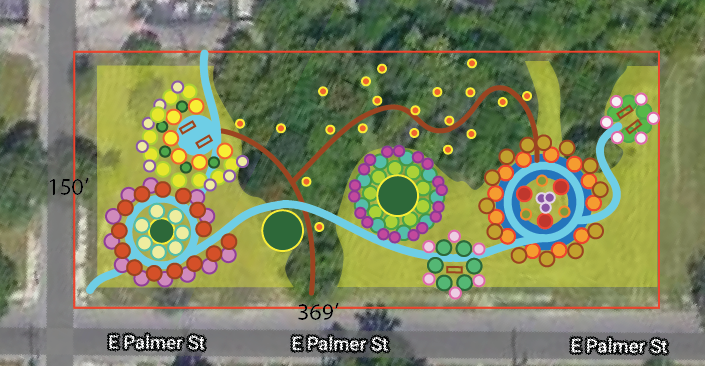Announcing our Next Project
Where the next two years will take us
We have some great news! The National Fish and Wildlife Foundation has awarded us a grant to do our next project. Arboretum Detroit is very excited to announce a native plant restoration project in partnership with Detroit Future City, and NFWF.
This is a preliminary design for the new park on the corner of Palmer and Elmwood.
We will be working with local partners Detroit Audubon, Singing Tree, US Fish and Wildlife, Fungi Freights, and hopefully you, to bring a native meadow and 200 native trees to 1.3 acres of vacant land on Palmer between Elmwood and Moran. This park will connect to several greenspaces in the community and be a green getaway for all neighbors, especially the residents of the adjacent health and rehabilitation center. We hope to have many of our amazing volunteers and supporters be a part of this project over the next 18 months. See below for work days and stay tuned for workshops that you can be a part of.
We will begin by clearing the existing forest of garbage as well as invasive trees and plants. Singing Tree, the local tree whisperers, will assist in identification and removal. It will be sad to cut any trees- even Ailanthus and Siberian Elm are currently providing shade and habitat. However, we will leave plenty of larger trees, and plant trees like Oaks, Sweet Gums, Black Gums, Hackberries, Sugar Maples, Cedars and many other natives that will provide food and shelter better suited to the native animal population. The park will be a native tree showcase, with 20 different species. Fungi Freights will run mushroom-related workshops on site and introduce mycorrhiza with the newly planted trees so they can quickly establish their symbiotic networks and thrive. Detroit Audubon will help prepare the ground and seed it with a Native Wildflower mix donated by US Fish and Wildlife Service. A beautiful meadow (see Callahan Bird Park) under and around the trees will provide shelter and food source for native and migrating birds. Detroit Audubon will also offer birding workshops.
This is a federal grant that requires significant in-kind donations and volunteer engagement. Our partners have offered generous discounts on their services, donating time and resources to make this project happen - we are extremely grateful to them. If you would like to contribute as well, here’s how:
Come to workdays - put your hands to work with us. We are looking to fulfill our requirement of 150 volunteer hours. There will be fun, food, and refreshments. You can see the dates and times here and sign up to receive email reminders.
Spread the word - tell friends you think might have time and energy to create a native forest park in the city.
Donate to us- with your financial support we can hire more people and pay them fairly. contributions also buy tools, supplies for our workdays, and help maintain our parks.
Let us know- please offer your wisdom to this project. Let us know what a native landscape means to you.
Connect us to Indigenous friends who may have an interest in helping guide such a project. We value all of your knowledge and are especially interested in indigenous perspectives and wisdom on these plants and this land.
Land Acknowledgement in progress: We acknowledge that Arboretum Detroit and the Poletown neighborhood have the privilege of existing and planting on unceded land originally stewarded by Niswi Ishkodewan Anishinaabeg: The Three Fires People who are Ojibwe, Odawa, and Potawatomi along with their neighbors the Seneca, Delaware, Shawnee and Wyandot nations. We wish to aid in reconnecting, Waawiiyaataanong, to its rightful heirs and stewards: the native peoples and plants of this place. We acknowledge and understand that these plants and people have existed and gathered on this land for much longer than the plants, peoples, and systems that now obscure it.
This project aims to begin the healing of the traumatized landscape. In turn we hope that the project will bring healing to all who participate. We recognize that this is unceded territory of the first nations who thrived here and are the original stewards of this land. Waawiyaatanong (aka Detroit) has been a central meeting place for Great Lakes Indigenous peoples including the Anishinaabe: Odawa, Ojibwe, and Potawatomi. Of course settler colonization meant the destruction of the native landscape, people, and ways of life here. Colonization has meant clear cutting, bulldozing, pouring of concrete, and the gridding of the landscape into city blocks.
With this project we consider deeply what it means to heal a small piece of land by returning many of the native trees and plants that were almost eradicated from this mowed and paved world. Let us hear and learn the original names and uses of these plants from those who know. Let us hone our intercultural competency and recognize the value of Indigenous Knowledge. Let us contribute our work as an offering to the Earth, and a declaration to the First Nations that we recognize indigenous wisdom and are willing to listen to the original stewards of this land and to the landscape herself.
How awesome it will feel to relieve a piece of this land of garbage and trauma. How amazing it will feel to seed the landscape with life and watch it grow into a meadow and a forest. We cannot erase the trauma and abuse of this land and her people, but we can make a better way forward for the Earth, our future with her, and with the original people of this land.
The greatest technology we have to fight the climate emergency caused by the western way of life is indigenous wisdom. It is my hope that people who work on and visit this park will consider this truth and reckon with it in ourselves.


